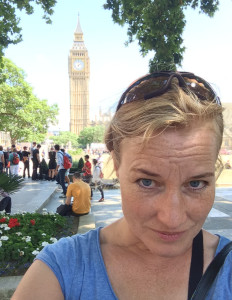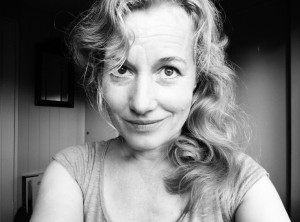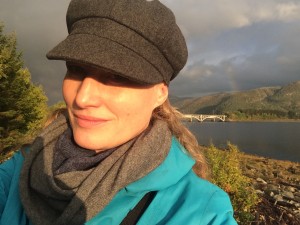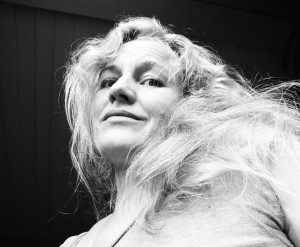Marion is an Ordain Woman supporter who lives in Norway; she’s formerly lived in Germany and Sweden and served a mission in England. You can read her profile here.
My (Swedish) mother joined the church when I was an infant. We lived in Giessen, Germany at the time. I was baptized in Munich at age eight. Later, after moving to Sweden and being a less active-family for a few years, we started going to church again when I was fourteen. We had to travel far at the time to get to church. It was a challenging, but important experience for me to travel/ponder/search/ pray. I’ve had a number of precious spiritual experiences growing up, and many of them have been facilitated (or caused) by me being a member of this church. I served a mission in England, and that year-and-a-half made me a happier person as I managed to focus less on my own life and more on other people. My family in Norway (where I live now) are not members / active members.
My favorite calling was probably working with young women! That was lovely, but is quite a while ago. I also enjoyed being an institute teacher and am enjoying being a gospel-doctrine teacher. It is intellectually and spiritually demanding and therefor rewarding to teach. I am not a perfect visiting-teacher, far from, but I find the visiting-teaching program inspired and inspiring.
I love the opportunity to sing together, to be quiet together, to ponder together, to explore faith and theology together. The opportunity to get to know people quite rapidly – easier, really, than when I meet friends in other places. I am in essence an introverted person and getting down to the “what is the meaning of the universe” and “why am I here” -type of questions suits me well, as I’m not very talented at small talk at all.
I love the theological concept that there is a part of each individual that was not created by God, but that is light, and that was given a spirit (soul) and then a body. I find this autonomy interesting; is solves (part of) the teodicé-problem – in my mind at least. It also makes us free moral agents; accountable and important in the unfolding history of this world.
However, I do see some inequalities. Men interpret and make the doctrine – our theology. They can listen to women if they want, and are encouraged to do so today, but when push-comes-to-shove no woman can say “Thus Saith the Lord” (Or “Thus Saith our Heavenly Mother”!). Over the centuries, this has caused the perceived “proper” role of women to be very narrowly defined and problematic to relate to for many of us. In my opinion, this imbalance also caused the church to venture out on the unhappy path of polygamy. Women such as Emma Smith and the female Relief-Society were not listened to and were not adhered – causing grave theological AND practical problems still today. Excuses for polygamy such as “we do not understand today” and “the Lord can command what he wants” come from a lack of empathy with our Mormon foremothers who had to sacrifice joy to an excruciating, and in my mind outrageous extent. The fact that female voices can easily be classified as “unfaithful”, “disobedient” or “selfish” if they do not agree with church-leadership aggravates the problem.
We see similar equality-deficiencies today in developing countries that we – as latter day saints – do not readily want to be compared to. Because most all of our male leaders sincerely try to follow Christ, we think that this unhappy power-dynamic will have no negative impact on us. But it does. It has. To the detriment of both men and women.
I also see very little recourse for women in disciplinary situations. We are at the mercy of all men and only men. As a people we are encouraged not to trust in the arm of flesh. But as women, in our religious community we tend to be found lacking if we do NOT trust in the “arm of flesh” (our men and ecclesiastical leaders) 100%.
A lot of – perhaps all of – the issues that were raised in the document “All Are Alike unto God” I find important. A couple of the issues led me to the paradigm where I am today. Men and women ought to make the same covenants with God – everywhere and in all places. Women ought not be one more step removed from deity than men. Worthiness or eligibility-interviews ought to be performed by a member of the same sex. (More work for the Young Women & Relief Society presidents!)
I discovered Mormon Feminism in 2011 as I was reading about the female Nobel-prize-winners Sirleaf, Gbowee & Karman I came across a list of “50 politicos to watch” with Joanna Brooks on it. This led me to read her book, blog, and expand my facebook friend-list with some wonderful, accomplished Mormon feminists. (Gratitude forever for adding me!). So at the first Ordain Women action in October of 2013, I was well aware of it and watching – and pondering.
After a not-so-glorious experience in the temple where I questioned my own honesty and authenticity in raising my hand at a particular part of the endowment-session, I had come to a crisis in praxis. It was almost physically painful to feel inauthentic. I have to add here that I believe family-history work is very inspired/inspiring, and that I cherish some symbols and the aspirational egalitarianism of the Temple. But just as many other women I have found parts of our theology not so easy to digest. Some weeks later I found the above-mentioned “All Are Alike” document. After postponing a bit and pondering it, I signed.
In 2013 after Ordain Women had their first action I had a sudden paradigm shift: I realized that we could fix each and every sexist problem listed in “All are Alike”, but new problems would just keep on cropping up – because the root of it all was our unequal heed to female/male voices. In other words, if women are not present in equal numbers at every decision-making table we will only go astray again – and again – and again. This I also hold to be true for a lack of diversity in other aspects. We are still a very white church when we look at our leadership. I was nudged further towards to posting when I saw a friend put up a very well-worded post and discussing it with her. Putting up a profile has helped me feel “whole” and authentic as both a Mormon and a feminist.
I think some ward-members were pretty jarred about it, I do not know, but imagine that I have been the subject of ward-councils more than once. I was very kindly but strongly encouraged to take my profile down, but I could not do so and continue to feel as an authentic person, so I declined. My family in Norway (where I live now) are not members. My husband is somewhat perturbed, I think, about the amount of time I spend online, but does not comment otherwise. I think of him as a feminist, even if that is not a label he has applied vocally to himself. Equality is, I think, very important to him. Most of my close friends are only happy and encouraging about it. Many other relatives and co-workers are probably more “perpetually surprised” that I am a Mormon “still”, but I feel only love and acceptance.
I hope that some members are seeing Ordain Women for what it is: a friendly “space for Mormons to articulate issues of gender inequality they may be hesitant to raise alone.” Activism suits me – I am an activist at heart and I think it is my responsibility to raise my voice and apply my mind in all walks of life where I see room for improvement. Some people may be different – perhaps their true talent is service, not seeking change – those roles are not mutually exclusive, but we certainly can express goodness in seven billion different ways. I respect that. I hope my views can continue to be respected. I hope there will be a greater level of acceptance for persons that do not quite fit the “Mormon mold.”









